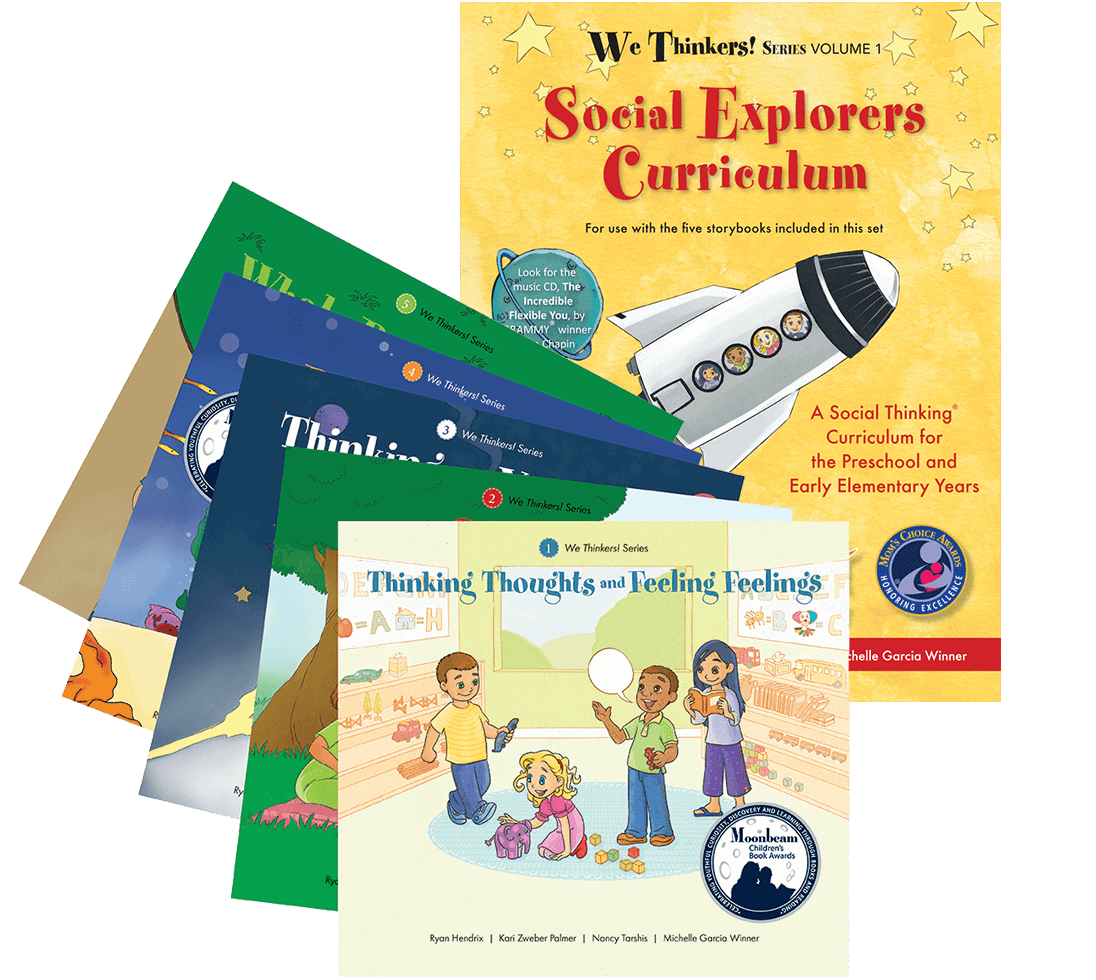Research/Resources
Evidence-Based Concepts for We Thinkers! Volume 1 and Volume 2
Joint Attention; Theory of Mind; Social Skills; Visual Supports; Imitation; Play-Based Learning; Imagination; Language-Based Learning; Self-Regulation; Social Emotional Learning; ASD; Cooperation; Social Attention; Self-Awareness; Positive Behavioral Intervention and Supports (PBIS)
Baron-Cohen, S. (2001). Theory of mind in normal development and autism. Prisme, 34, 174-183.
Beck, I. L., McKeown, M. G., & Omanson, R. C. (1987). The effects and uses of diverse vocabulary instructional techniques. The Nature of Vocabulary Acquisition, 147-163.
Behne, T., Carpenter, M., Call, J., & Tomasello, M. (2005). Unwilling versus unable: Infants' understanding of intentional action. Developmental Psychology, 41(2), 328-37.
Bloom, L. (1998). Language development and emotional expression. Pediatrics, 102(5), e1272.
Bodrova, E. Leong, D.J. (1996). Tools of the mind: The Vygotskian approach to early childhood education. Englewood Cliffs, NJ: Merrill/Prentice Hall.
Carpenter, M., Call, J., & Tomasello, M. (2005). Twelve-and 18-month-olds copy actions in terms of goals. Developmental Science, 8(1), F13-20.
Carpenter, M., Nagell, K., & Tomasello, M. (1998). Social cognition, joint attention, and communicative competence from 9 to 15 months of age. Monographs of the Society for Research in Child Development, 63 (4, Serial No. 255).
Choi, D. H., & Kim, J. (2003). Practicing social skills training for young children with low peer acceptance: A cognitive-social learning model. Early Childhood Education Journal, 31(1), 41-46.
Crooke, P. J., Hendrix, R. E., & Rachman, J. Y. (2008). Brief report: Measuring the effectiveness of teaching social thinking to children with Asperger syndrome (AS) and high functioning autism (HFA). Journal of Autism and Developmental Disorders, 38(3), 581-91.
Farroni, T., Csibra, G., Simion, F., & Johnson, M. H. (2002). Eye contact detection in humans from birth. Proceedings of the National Academy of Sciences of the United States of America, 99(14), 9602-5.
Gilliam, W. S. (2005). Prekindergarteners left behind: Expulsion rates in state prekindergarten systems. Foundation for Child Development Policy Brief Series 3. New York, NY: Foundation for Child Development.
Greene, R.W. (1998; 2001; 2005). The Explosive Child: A New Approach for Understanding and Parenting Easily Frustrated, Chronically Inflexible Children. New York: Harper Collins.
Harris, P. L., Kavanaugh, R. D., Dowson, L. (1997). The depiction of imaginary transformations: Early comprehension of a symbolic function. Cognitive Development, Volume 12(1).
Kupyers, L. (2011). The Zones of Regulation. San Jose, CA: Think Social Publishing Inc.
Leslie, A. M. (1994). Pretending and believing: Issues in the theory of ToM. Cognition, 50(1-3), 211-38.
Liebal, K, Colombi, C., Rogers, S. J., Warneken, F., & Tomasello, M. (2008). Helping and cooperation in children with autism. Journal of Autism and Developmental Disorders, 38(2), 224-38.
Meltzoff, A. N. (2005). Imitation and other minds: The "Like Me" hypothesis. In S. Hurley and N. Chater (Eds.), Perspectives on Imitation: From Neuroscience to Social Science (Vol. 2, pp. 55-77). Cambridge, MA: MIT Press.
Meltzoff, A. N., & Brooks, R. (2007). Eyes wide shut: The importance of eyes in infant gaze following and understanding other minds. In R. Flom, K. Lee, & D. Muir (Eds.), Gaze following: Its development and significance (pp. 217-241). Mahwah, NJ: Erlbaum.
Meltzoff, A. N., & Brooks, R. (2009). Social cognition and language: The role of gaze following in early word learning. In J. Colombo, P. McCardle, & L. Freund (Eds.), Infant pathways to language: Methods, models, and research directions (pp. 169-194). New York: Psychology Press/Taylor Francis.
Meltzoff, A. N., & Decety, J. (2003). What imitation tells us about social cognition: A rapprochement between developmental psychology and cognitive neuroscience. Philosophical Transactions of the Royal Society of London. Series B, Biological Sciences, 358(1431), 491-500.
Miller, E. and Almon, J. (2009). Crisis in the Kindergarten: Why Children Need to Play in School. College Park, MD: Alliance for Childhood.
Prizant, B. M., Wetherby, A. M., Rubin, E., Laurent, A, C., and Rydell, P. J. (2006). THE SCERTS® Model: Volume I Assessment; Volume II Program planning and intervention. Baltimore, MD: Brookes Publishing.
Rapacholi, B.M., and Gopnick, A. (1997). Early reasoning about desires: evidence from 14-18 month olds. Developmental Psychology, 33, 12-21.
Segal, M. (2004). The roots and fruits of pretending. In E. Zigler, D. Singer, & S. Bishop-Josef (Eds.), Children’ Play: The roots of reading (pp. 33-48). London, UK: Zero to Three Press.
Shonkoff, J. P., & Phillips, D. A. (Eds.) (2000). From Neurons to Neighborhoods: The Science Of Early Childhood Development. Washington, DC: National Academy Press.
Slaughter, V., Dennis, M. J., & Pritchard, M. (2002). Theory of mind and peer acceptance in preschool children. British Journal of Developmental Psychology, 20(4), 545-564.
Tomasello, M. (1995). Joint attention as social cognition. In C. Moore, P.J. Dunham (Eds.), Joint attention: Its origins and role in development (pp. 103-130). Hillsdale, NJ, England: Lawrence Erlbaum Associates, Inc.
Tomasello, M. (2009). Why We Cooperate. Cambridge, MA: MIT Press.
Tomasello, M., Carpenter, M., Call, J., Behne, T., & Moll, H. (2005). Understanding and sharing intentions: The origins of cultural cognition. Behavioral and Brain Sciences, 28(5), 675-735.
Truesdale, S. P. (1990). Whole-body listening: Developing active auditory skills. Language Speech and Hearing Services in School, 21: 183-184.
Vermeulen, P. (2012). Autism as Context Blindness. Overland Park, KS: AAPC Publishing.
Warneken, F., & Tomasello, M. (2008). Extrinsic rewards undermine altruistic tendencies in 20-month-olds. Developmental Psychology, 44(6), 1785-8.
Wimmer, H., & Perner, J. (1983). Beliefs about beliefs: Representation and constraining function of wrong beliefs in young children's understanding of deception. Cognition, 13 (1): 103–128.
Winner, M.G. (2005). Think Social! A Social Thinking Curriculum for School-Age Students. San Jose, CA: Think Social Publishing.
Winner, M.G. (2007). Thinking About YOU Thinking About ME. San Jose, CA: Think Social Publishing.
Vygotsky, L. S. (1966). Play and its role in the mental development of the child. Soviet Psychology, 5: 6-18.









